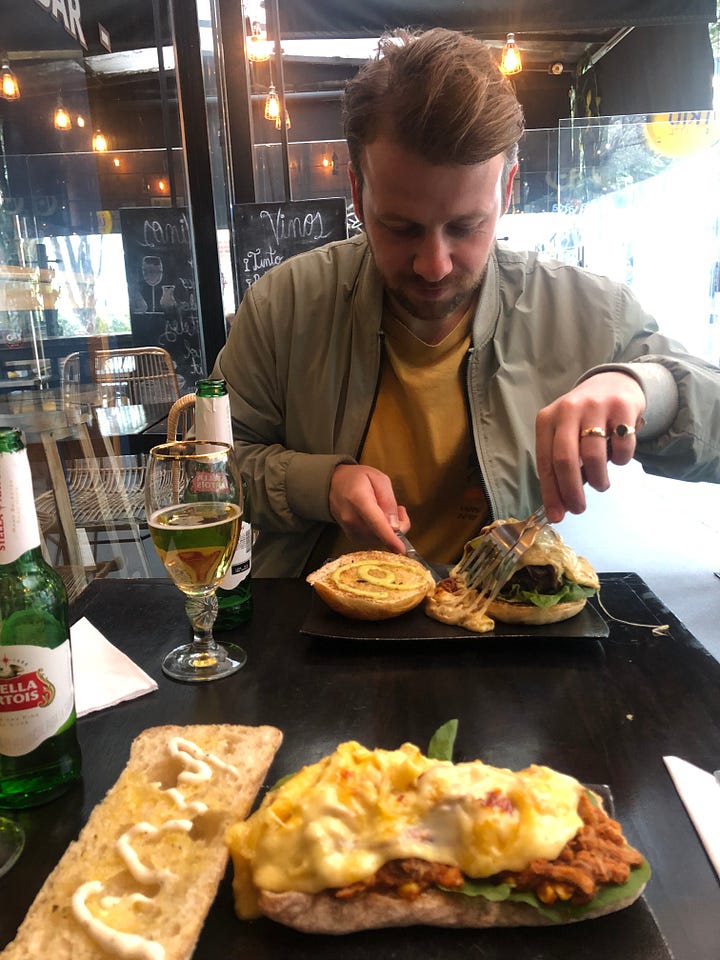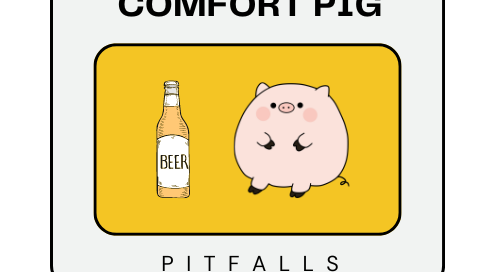My First 6 Pitfalls in Bogotá
It’s time to take stock of my mishaps so far, before I lose track.
It’s been six weeks since I moved to Colombia’s capital. Six weeks of settling in imperfectly – making blunders and decisions while hungover, skipping the research, and learning along the way. This may become a series if I keep averaging one a week.
Credit where credit is due to my husband Harry, who has made (almost) all of the following mistakes right alongside me.
1. Slamming an Uber door
This is around day three, and Harry and I are in the throes of Bogotá’s mandatory altitude sickness phase. Tired and useless, we get an Uber from a shopping centre to our hotel, surrendering to a 2 pm nap.
“Buenas tardes,” we call to the driver as we hop out, swinging the passenger door closed. “Puta - son of a bitch!” he shouts in response, before speeding away. We look at each other, exhausted and confused.
Later we are told that here, it’s considered polite to shut car doors as gently as you can. I’m still not sure whether this is purely cultural, or to do with car quality. Some taxis even have signs in their windows. They really hate it.
But even with this knowledge, it’s a surprisingly hard habit to break. Closing a door softly and securely is an art I’m yet to master.
2. Pronouncing “con tarjeta” incorrectly
“¿Puedo pagar con tarjeta?” I ask the street vendor selling hot, stuffed arepas. In my head, I'm clearly asking if I can pay “with card”. Except, that would sound like con tar-heh-tah and not more like con tar-gee-tuh or however I pronounce it my first week here. I’m also likely mumbling.
He gives a swift nod and makes my order. But when it comes to payment, it’s cash only. And I have none. Cue a lot of manic gesturing while I wolf down the arepa - the vendor watching in bemusement - followed by a mad dash to find the nearest ATM.
The vendor was very nice about it – and the arepa was gorgeous and gooey with cheese – but it wasn’t my most relaxed lunch.
3. Ordering wine in a restaurant
Beer, Uber rides, bills - some things in Colombia are comparatively great value, coming from the UK. Unfortunately, wine does not make this list.
This is especially true for wine in restaurants, as I discovered the first time we went out for Italian. Vocabulary being limited to “¿algo más?” (anything else?) at the time, we must have been brought five bottles before my husband and I panic-chose a merlot that made up 80% of our total bill.
Now, I trot to the supermarket whenever I have a hankering for wine. I also rely on designated bring-a-bottle girl’s nights twice a month.
If you enjoy beer like me, this is by far the best value alcohol. You can often find bottles for 5000 Colombian pesos (one British pound) each. My local favourite is Club Colombia Dorada, but Stella Artois and Corona are also widely available – usually for around 10,000 pesos (or two British pounds).


4. Leaving Bogotá during long-weekend rush hour
Bogotá is big. 8-million-people big in the Capital district; 11-million big in the entire metro area. In 2023, it topped the global rankings for the worst traffic in a city. Armed with this information, a group of us – all new expats - hire a minibus to take us out of the city, after work on a Friday. Monday is a public holiday, so this is a long weekend.
The traffic is so gridlocked that one of our group gets out and walks her way out of Bogotá, right alongside us on the pavement. In fact, she overtakes our minibus so frequently that she often has to circle back toward us in laps.
Our journey to Apulo, where we are renting a finca (holiday home) in the sun, takes around six and a half hours. For context, this is a two-and-a-half-hour journey without traffic.
This affects the group in different ways. Some hit the tequila hard. Others slide down in their seats, jackets over their heads, and try to pretend they are anywhere else. Music goes on. There’s an outfit change into Scary Spice. An incident involving a shoe and a window. Stand-up routines. Toilet breaks in bushes with the bus still in motion.
We arrive in tatters. But the pool is worth it.
5. Sitting in the back of an Uber
I made another Uber blunder in the early days. I sat in the back instead of next to the driver. This didn’t incite the same anger as door-slamming, but still, it’s handy to know that Uber drivers usually want someone in the front - to make the journey more inconspicuous.
Uber operates in somewhat of a grey area here. It’s legal on a technicality, but this status has fluctuated over the years, and there is a history of taxi drivers harassing Uber drivers.
To get around the ban which sought to protect Colombian taxis from unfair competition, Uber is actually operating as a car rental service. There’s no ignoring that this is extremely cheeky. And legal thin ice.
Right now, I'm choosing to stick to Uber for two reasons. At least in Bogotá, other taxis have a reputation for overcharging and being less safe. Could this be exaggerated in expat-lore? Absolutely. I haven’t been here long enough to know. But if you don’t use Uber, and you’re leaving a restaurant or bar, it’s best to ask them to call you a taxi at night.
6. Taking the water-cut hours too literally
Bogotá is in the middle of a drought. Right now, this means that our district's water supply is turned off once every three weeks for 24 hours. This is surprisingly manageable for the most part – I say, as someone who has no children and can turn up for work in pyjamas.
Still, I wouldn’t suggest staying out until 3 am the night before, going to bed without showering, waking up coated in alcohol-induced sweat, and finding that the water is already off at 7 am (we had been told it starts from 8 am).
During this accidental “pig girl Saturday”, be mindful of making social plans, don’t plan pasta for dinner, and stay away from mirrors.
Although I'm not suggesting you sacrifice a Friday night just because your water’s off on Saturday. Just take that 3 am shower.



